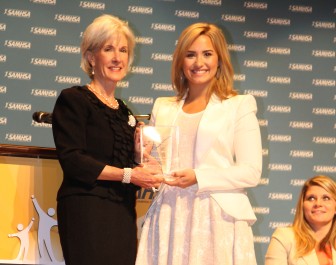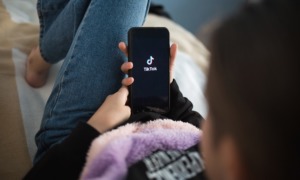 WASHINGTON, D.C. — Having social relationships and connections to others can help youth overcome metal health issues, addiction and other challenges. That’s the message singer and actress Demi Lovato shared at a press briefing hosted by the Substance Abuse and Mental Health Services Administration (SAMHSA) this morning at the University of the District of Columbia Community College. U.S. Department of Health and Human Services Secretary Kathleen Sebelius also presented Lovato with an award for her role as a mentor and spokesperson at the event focusing on this Thursday’s National Children’s Mental Health Awareness Day.
WASHINGTON, D.C. — Having social relationships and connections to others can help youth overcome metal health issues, addiction and other challenges. That’s the message singer and actress Demi Lovato shared at a press briefing hosted by the Substance Abuse and Mental Health Services Administration (SAMHSA) this morning at the University of the District of Columbia Community College. U.S. Department of Health and Human Services Secretary Kathleen Sebelius also presented Lovato with an award for her role as a mentor and spokesperson at the event focusing on this Thursday’s National Children’s Mental Health Awareness Day.
Lovato and other speakers said that support from others is essential for young adults, and that overcoming the stigma associated with mental illness is key for helping youth. When she was struggling with her own mental health issues, Lovato explained, she worried that if people knew her diagnosis they wouldn’t want to be her friend, and she wouldn’t be able to work. She was at the event “to tell young people who are asking those questions … that they are not alone.” She added, “I am a survivor of mental health and addiction issues and I am not ashamed, in fact, I am more than honored to be here.”
In her remarks before introducing Lovato, Secretary Sebelius said that although society has no greater job than protecting our children and ensuring their health, “when it comes to mental health issues, we fall short.” She praised improvements in health care coverage under the Affordable Care Act, but said “we can do even more,” referencing President Obama’s support for Project AWARE (Advancing Wellness and Resilience in Education) in his FY2014 budget, and remarking that the President has asked her and Education Secretary Arne Duncan to launch a public awareness campaign to help adults recognize mental health symptoms, and to “create a culture where young people feel comfortable asking for help when they need it.” Sebelius and other speakers also highlighted several new reports related to children’s and young adult’s mental health.
Lacy Kendrick Burk, executive director of Youth M.O.V.E. (Motivating Others through Voices of Experience) National, a youth-led nonprofit, also spoke, sharing her story of how mental illness can go unaddressed for too long. Burk explained that although she was involved with the child welfare system, everyone thought she was a foster care success story. “No one knew that … I was reeling from the effects of trauma” and undiagnosed mental health issues, she explained. Burk said that after she jeopardized a full scholarship to college because she couldn’t get out of bed to go to class, support from her mother and other caring adults and peers helped her eventually get her college and graduate degrees and succeed in her professional and personal lives.
Burk told Youth Today that when adults know and have a greater connection with the young people they work with, they would be better able to recognize when youth are struggling. She recommends that all youth serving professionals receive mental health first aid training and be consistently available so youth know “they can come to you when they are ready.”
SAMHSA Administrator Pamela S. Hyde closed the event with a twist on the axiom “children are our future,” saying that children can be our future offenders, our future homeless, or they can be our future teachers, actors, or success stories. After her formal remarks, Hyde further explained to Youth Today that in order to achieve better outcomes for youth, adults who work with kids need to know about mental health issues and be willing to speak about them. Hyde added that sometimes systems don’t do the best job of teaching adults how essential emotional health is for a child’s proper development, so training opportunities are important, including helping youth-serving professionals understand the difference between normal developmental issues in young people and the signs and symptoms of more serious issues.
Hyde referenced the large number of youth in the child welfare system receiving psychotropic medications, saying that her agency and others are working to provide more rehabilitative, therapeutic and supportive services, to help avoid overreliance on simply medicating youth with mental health challenges.
Lisa Pilnik, JD, MS, is a freelance writer, consultant, and co-founder of Child & Family Policy Associates, a Maryland-based consulting firm.
Singer/Actress Demi Lovato receives an award from HHS Secretary Kathleen Sebelius. Photo by Lisa Pilnik































